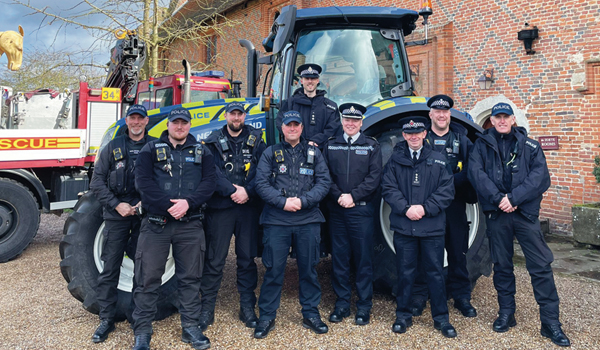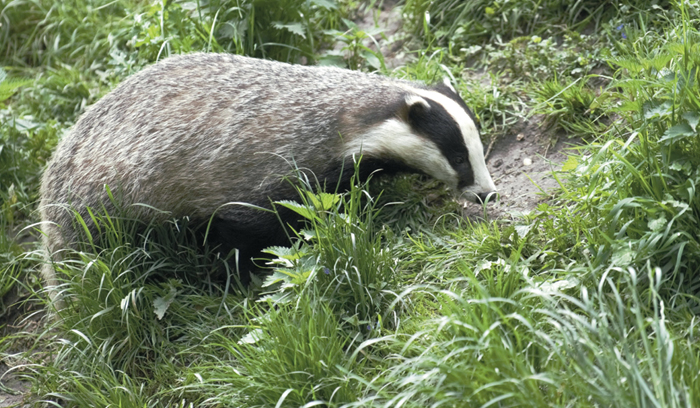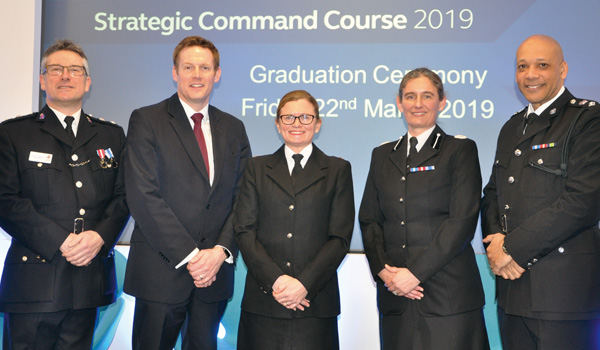Rural engagement
Heather Turner looks back at 12 months in the life of the Essex Police Rural Engagement Team and its work to keep communities safe in a county that is more than 70 per cent rural.
Our Rural Engagement Team was set up specifically to engage with our rural communities, and during the past 12 months, officers have secured some significant results, in and out of court. As its name suggests, engaging with rural communities – residents, farmers, landowners, businesspeople, local organisations and staff from other agencies who work in them – is a huge part of the job.
Inspector Terry Jacobs explains: “Our county is 72 per cent rural and that is a lot of ground to cover. Some communities are extremely isolated and it is our job to reach them, keep in contact and help identify issues which matter to them.
“Working with them, we can then tackle problems such as anti-social behaviour, fly-tipping, poaching and farm thefts. But we rely on people to tell us what their concerns are and to provide us with information.
“We can’t always act on that information immediately but we use it to build a picture and what they give us might provide the final piece of the jigsaw we need to make an arrest or issue a summons to court.”
Two men who admitted conspiring to steal £380,000 of agricultural global positioning systems, satellite receivers, computer screens and control boxes were sentenced to a total of six years and ten months in jail.
They had targeted 13 farms and estates across Essex between September 28 and October 27, 2021. Last November, one man was jailed for three years and ten months and a deprivation order was made on his car. The other was jailed last year for three years. It was a complex investigation but rural engagement officer PC Samantha Smith tracked them down and brought them to justice.
Another two men were banned from owning or keeping dogs for five years after being handed disqualification orders by Colchester magistrates on February 21 under section 66 of the Police, Crime, Sentencing and Courts Act 2022 in what is believed to be a national first, after the pair each admitted a charge of daytime trespass in pursuit of game.
They were detained by rural engagement officers in the Saffron Walden area last October after travelling from South London with dogs that were to be used to poach game.
And a man who stabbed a fox with a garden fork in Pattiswick received an 18-week suspended jail sentence in August and 200 hours of community service after he admitted hunting a wild mammal with dogs – an offence under the Hunting Act 2004 – and causing unnecessary suffering to a protected animal – an offence under the Animal Welfare Act 2006. He was also banned from keeping any dog for five years.
The team makes sure it focuses on hare coursing and poaching as they understand the damage, the cost of that damage and the fear this cruel crime can cause in our more isolated communities.
During the 2022/23 hare coursing season, which ran from September to March, rural crime teams across the Eastern Counties and Kent worked with the National Police Air Service and used drones to spot hare coursers in action. This has led to several people being reported and charged for the crime.
Our rural engagement officers have issued 32 community protection warnings and notices during the year, mostly for people who cause nuisance and anti-social behaviour in our rural communities, including hare coursing.
As well, in the past 12 months, officers also issued a number of postal requisitions summonsing people to appear at court for a variety of offences and made arrests for drink and drug-driving, other driving offences, assault, criminal damage, possession of drugs and offensive weapons, robbery and theft.
During the spring and summer, officers spend a lot of their time managing unauthorised encampments. Since the Rural Engagement Team’s formation in 2018, the number of such encampments have fallen by 70 per cent – from 171 between April and September 2018 to 52 during the same period in 2022.
Insp Jacobs says: “Our officers visit every single encampment, speak with the people there and set out expectations around conduct and legislation in line with the rights of all communities.
“If legislation is breached, we will follow national guidance and, where appropriate, we will require groups to leave the land, explaining the grounds why they are being moved. We’ve found that many groups acting anti-socially have stopped visiting Essex and conduct has improved.”
In the 12 months to March 31, 2023, officers recovered or seized 159 vehicles. The vast majority of vehicles seized were cars and vans found to be uninsured or which were driven by people with an incorrect driving licence or even without a licence at all. Vehicles are seized under section 165 of the Road Traffic Act.
The remainder were stolen vehicles, tracked down and recovered following an investigation. In just one month – September – the team recovered seven caravans, two vans and a dumper truck. While in November, the keen eyes of PC Matt Harkness led to the recovery of a distinctive Land Rover Defender in Wickford plus another three stolen vehicles, too.
Rural road safety is another area of focus. Many road collisions in Essex occur on rural roads and speeding is often a contributing factor.
Between April 1, 2022 and March 31, 2023, officers stopped and reported 1,277 people for traffic offences, ranging from the ‘fatal four’ – drink/drug-driving, speeding, driving while using a mobile phone and driving without a seatbelt – to vehicle defects and illegal modifications.
Insp Jacobs explained: “Rural road safety is a big concern for rural communities. We conduct regular road safety operations which, of course, include speed checks but we also want to make sure vehicles of all kinds are safe to drive on our roads.
“Collisions don’t have to cause death or serious injury to have a long-lasting and detrimental effect on those involved.
“Losing the use of a vehicle while it’s being repaired can have severe implications, leaving people isolated and financially strapped if they haven’t got an alternative means of transport to get them to work, the shops or social events.”
A rural engagement officer put himself at risk in October when he was called in to the pursuit of a man who had failed to stop for officers investigating reports of people trespassing in pursuit of game near Newport.
The vehicle reached speeds of 70mph in 30mph speed limits and forced other drivers and a cyclist to take evasive action by driving on the wrong side of the carriageway and on pavements at times.
When the vehicle reached Enfield in North London, the officer used a tactical stop to bring the pursuit safety to an end. The driver was later jailed for 12 months and banned from driving for five years after admitting dangerous driving and driving without insurance.
To reach more isolated parts of Essex, the Rural Engagement Team has introduced rural bike patrols in country parks and coastal areas to cover areas which are often out of reach for normal police vehicles.
During one of the first, last September, Sergeant Ben Felton was in Friday Woods, Colchester, when he was flagged down by a woman worried about her mother-in-law who had fallen. Within 15 minutes he had located her, providing first aid and calling an ambulance.
Between April 1, 2022, and March 31, 2023, rural engagement officers spent almost 1,800 hours in local communities on patrol, meeting people and conducting speed checks. They also stopped 594 people and subsequently searched 109 of them.
Insp Jacobs says: “Engagement is our priority but this comes in all shapes and forms. Stop and search is one of them.
“However, officers only exercise this police power when they suspect criminal activity, such as carrying weapons, drugs or stolen property.”
The team has been loaned a T6 tractor for six months by New Holland in Basildon and Ernest Doe and Sons in Ulting. They will be taking it to large rural events and using it as a ‘draw’ to encourage people to go over and talk to them about crime and anti-social behaviour and ask for crime prevention advice.
The team’s expertise has been drawn on nationally. This month Cumbria Constabulary visited to find out how our rural engagement officers tackle specifically rural issues, such as hare coursing and unauthorised encampments, and engage with our rural communities.
And in February, officers visited Westminster to discuss wildlife legislation and how it can be improved with the All-Party Parliamentary Group for Animal Welfare (APGAW).
As you would imagine, animal welfare is high on the team’s agenda. It is not just cruelty to animals, such as hares and foxes – officers will also take action if they see animals being neglected or treated badly.
Earlier this year, PC Nigel Wright and Special Sergeant Richard Raffell were making inquiries on another matter in the Rawreth area when PC Wright noticed what he initially thought was a dead pony lying on a pile of rubble.
The pair went over to investigate and realised it was still alive but in a very poor condition. PC Wright contacted the RSPCA and a vet managed to get the pony back on its feet. Barney is now flourishing at Redwings Horse Sanctuary.
And in January, PC Jed Raven, the force’s Wildlife, Heritage and Environmental Crime officer, was called in to supervise the draining of Oakwood Pond in Harlow after body parts were discovered. He was there to ensure that fish in the pond were safely taken out and then returned after the water was allowed to flow back in.
Just a week later, his expertise was called for again when he attended Rochford Reservoir during the rescue of a common seal which had got lost and swum upriver from the sea.
During the year the team qualified as heritage crime officers after training with Historic England and have already been dealing with heritage crimes – which can range from magnet fishing and illegal metal detecting to churches having roofs stripped of lead, or even people causing damage to prehistoric monuments by lighting barbecues on them.
“You are never far from history in this country although it’s not always obvious,” said Insp Jacobs. “We are now more aware of all the possibilities and can work with land and property owners and the custodians of historic collections to help them protect our heritage.”
Heather Turner is media officer at Essex Police.
Inconsistent laws and funding putting wildlife in danger
Illegal wildlife crimes such as fox hunting, badger baiting and hare coursing are going on under the radar in the UK, according to new research, with inconsistent laws, a chronic shortage of resourcing and a lack of awareness compounding the problem, writes Paul Jacques.
The latest report from the International Fund for Animal Welfare (IFAW), also highlights “mounting concerns” about wildlife crime links to organised crime. Specifically, its research found:
- 81 per cent of police force respondents said they felt wildlife crime was linked to theft and dishonesty offences;
- 50 per cent highlighted links to firearms;
- 38 per cent linked it to drugs, and;
- 50 per cent believed wildlife crime was connected to violent crimes.
The IFAW says its report, Make wildlife matter – spotlight on wildlife crime: working with police and enforcers for change, is the most comprehensive snapshot of the national wildlife crime picture since the largely unaddressed United Nations Office on Drugs and Crime (UNDOC) recommendations in 2021 that wildlife crime needs to be better prioritised.
Wildlife crime – which increased by an estimated 30 per cent between 2019 and 2021 (from 1,056 to 1,414 incidents) – is broadly defined as the illegal exploitation of wildlife species, including poaching, such as illegal hunting, fishing, killing or capturing; abuse; and trafficking of wild animal species.
Crimes reported included hares chased and ripped apart by dogs for bets, the shooting of birds of prey, the stealing of bird’s eggs, illegal fox hunting and badgers being dug out and ‘baited’ – set upon by dogs. The IFAW says there are an estimated 30,000 offences against badgers alone in the UK each year.
The National Police Chiefs’ Council (NPCC) estimates that the illegal wildlife trade is worth up to £17 billion a year and is a significant serious and organised crime generator – the fourth largest after drugs, firearms and human trafficking.
Research shows that criminal organisations are diversifying their portfolio from ‘traditional’ criminal activities, such as drug trafficking or human trafficking, into the illegal wildlife trade – driven by the perception of the low risks of being caught and high profits.
The NPCC’s Rural and Wildlife Crime Strategy 2022-2025 also shows there are “tangible links” between specific wildlife crime types and organised criminality, such as in the case of hare coursing.
There are also strong links to domestic offending, in that the most prolific offenders may embark on their offending through the abuse of animals, says the NPCC.
Studies have highlighted the “disturbing connection” between animal abuse and crimes including rape, sexual homicide, domestic abuse and robbery. For example, research reveals that 70 per cent of people found guilty of animal abuse have committed other crimes, and 100 per cent of individuals who commit sexual homicide have a history of animal abuse.
And Chief Inspector Kevin Kelly, head of the National Wildlife Crime Unit (NWCU), warns that as the policing response adapts and improves, the methods offenders use to persecute and exploit animals also change too.
In his foreword to the IFAW report, he said: “In recent times I have seen wildlife crime transcend into the digital age and become cyber-enabled across many priority areas.
“I have first-hand experience of organised crime groups who are exploiting animals and people to make ill-gotten financial gains by facilitating the illegal wildlife trade, and I have sadly seen the levels of cruelty and barbarity shown towards animals that far exceed my worst fears.
“To give the best service we rely on relationships within policing. We also need the right partners and charities to help keep wildlife crime in the policing priorities. If it was down to policing alone then wildlife crime would not be recognised by world governments and enforcement bodies.
“Wildlife crime and specifically the illegal wildlife trade is one of the few areas of society where there is a total unified voice.”
Police, legal experts and non-governmental organisations (NGOs) cite wildlife crime’s ‘non-notifiable’ status as a major source of its inequality under the law. This means incidents do not have to be reported by the police to the Home Office that uses these to compile national crime statistics.
The IFAW says real figure for wildlife crime is likely to be much higher than latest figures suggests – “in the tens of thousands” – because of the voluntary collation of data.
One NGO research participant commented that the system makes it not worth some officers’ time in investigating wildlife crime: “Sadly, it’s let down at the very end stage… some of these trials take four to five days and then the guy gets a £200 fine or only 60 hours community service. You can ask what’s the deterrent value in that?”
And because wildlife crimes occur under such a veil of secrecy and in remote places, overstretched police forces have difficulty allocating resources to investigate and prosecute them, says the IFAW.
The IFAW study, conducted by researchers from Nottingham Trent University (NTU) and the University of Gloucester, found this lack of data, resource and expertise means wildlife crime is falling down the list of policing priorities. This is despite it being one of the most lucrative areas of crime globally.
The study found effective wildlife crime enforcement was heavily dependent on the “enthusiasm, dedication and specialist knowledge of individual officers”.
The combined effect of law inconsistency, poor application and resource issues is that even the cruellest crimes against wild animals are seen not to count, said researchers. Under UK law they simply do not matter as much as crimes involving drugs, firearms and violence against people. This is despite evidence of links between wildlife crime and other offences.
All the wildlife crime officers questioned agreed that wildlife offending was linked to other forms of serious crime, and 89 per cent said wildlife crime should be given the same priority as more traditional types of crime.
Wildlife crimes were often seen as being victimless and therefore considered lesser offences. The study suggests that this lack of a human victim leads to under reporting and a perception of less threat, harm, and risk.
And the fact that only a small amount of serious wildlife crimes are notifiable was seen as an issue by all of the enforcement officers who completed questionnaires, as it means the lesser status in legislation impacts on the priority afforded to wildlife crime and its recording.
“This contributes to a lack of clear data on the level of wildlife crimes, as recording is inconsistent and varies by location, making it difficult to identify where priorities should lie,” said researchers.
The research also identified wildlife crime as an under-resourced area that is heavily reliant on the “dedication of individual officers” and support from NGOs, such as the RSPB, RSPCA, and the League Against Cruel Sports.
Cuts in policing budgets due to austerity measures are also impacting on the effectiveness of wildlife policing, the study shows.
Participants raised concerns about the lack of available expertise in some areas, particularly when prosecutors with expert knowledge and experienced wildlife crime officers move to other roles with no guarantee that the specialist resource will be retained.
While the role of wildlife crime officer is recognised as an integral part of the policing response to wildlife crime, participants identified issues with training and the extent to which these officers are able to dedicate themselves to this enforcement given other demands.
Dr Angus Nurse, research lead and head of criminology at NTU’s School of Social Sciences, said: “We found that effective wildlife crime enforcement is heavily dependent on the enthusiasm, dedication and specialist knowledge of individual officers and prosecutors rather than there being a clear, coordinated, effective permanent system in place across the UK.”
The report says there should be at least one dedicated full-time wildlife crime officer in each force and more consistent enforcement and prosecution guidelines.
“Wildlife in the UK is already in crisis – being pushed to the brink through habitat loss, climate change and pollution. But these alarming findings show that criminals are purposefully going out of their way to harm or make profit from them,” said Frances Goodrum, head of campaigns at IFAW UK.
“The fact that wildlife crime cannot be reported as a crime in a meaningful way means the Government cannot measure or manage the current situation. Countless sinister crimes could be being committed – we simply do not know – it is all very ‘finger in the air’.
“This must change – our wildlife deserves better.” She said because wildlife crimes occur under such a veil of secrecy and in remote places, overstretched police forces have difficulty allocating resources to investigate and prosecute them.
To tackle the problem the IFAW is launching a campaign called ‘Make wildlife matter’, which calls on the Government to:
- Make wildlife crimes notifiable;
- Harmonise all UK wildlife law;
- Ensure there is at least one dedicated full-time wildlife crime officer per force;
- Incorporate wildlife crime into the Policing Education Qualification Framework; and
- Develop enforcement, prosecution and sentencing guidelines to combat inconsistencies around wildlife crime scenarios and how those should be dealt with.
Crucially both the UNDOC and the Law Commission recommend that the “confusing patchwork” of UK wildlife crime legislation be consolidated under one law – for example a wildlife management act, says the IFAW.
“Yet despite UK government claims during its 2021 G7 presidency that wildlife crime is a priority, their recommendations remain unaddressed. And there is still no national system in place to indicate which government body should take the lead in relation to the enforcement of wildlife crime,” it adds.
“Combined with relative government inaction on both recommendations, the research findings paint a grim picture of a nation where wildlife crime is given lower status.”





